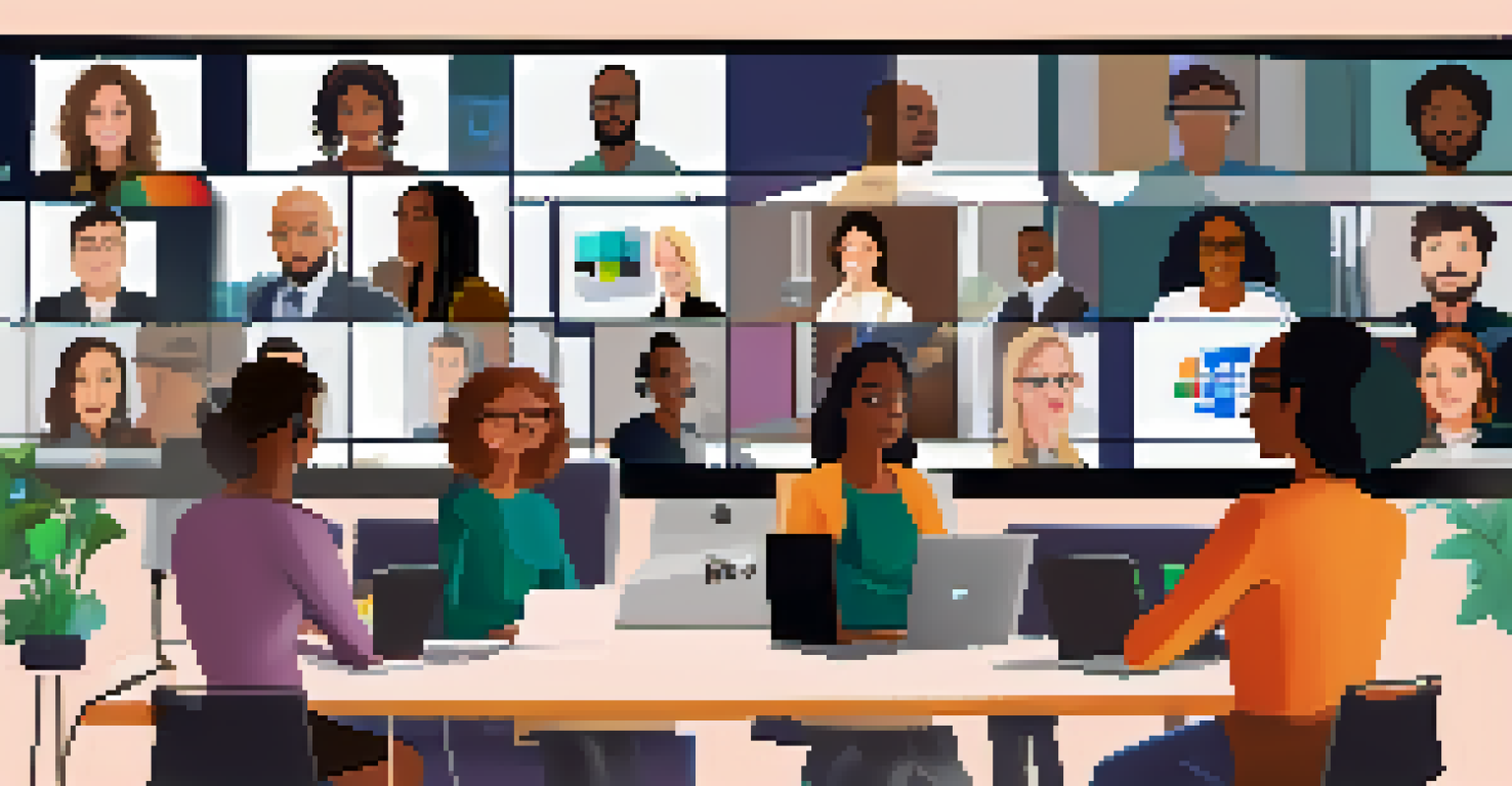The Future of Work: AI's Role in Career Development

Understanding AI and Its Growing Influence in Workspaces
Artificial Intelligence (AI) is no longer just a buzzword; it's a game changer in the world of work. From automating mundane tasks to providing insights that drive decision-making, AI is reshaping how we approach our careers. By streamlining processes and improving efficiency, AI allows professionals to focus more on creative and strategic tasks, enhancing job satisfaction.
The biggest risk is not taking any risk. In a world that is changing really quickly, the only strategy that is guaranteed to fail is not taking risks.
Consider the example of AI-driven recruitment platforms that analyze resumes and identify the best candidates in seconds. This not only speeds up the hiring process but also helps companies find talent that aligns closely with their needs. As AI continues to evolve, it’s clear that its influence will only expand, making it essential for workers to understand its role in their fields.
Moreover, AI technologies can provide personalized learning experiences, helping individuals develop the skills they need for future job demands. As we look ahead, embracing AI will be crucial for career development, making it a key component of the future workplace.
AI-Driven Skill Development: Tailoring Learning Paths
One of the most exciting aspects of AI in career development is its ability to personalize learning. Traditional education often takes a one-size-fits-all approach, but AI can analyze an individual’s strengths and weaknesses, recommending tailored courses or resources. This ensures that professionals are not just learning but are acquiring skills that are relevant and necessary for their career progression.

For instance, platforms like Coursera and LinkedIn Learning use AI algorithms to suggest courses based on your current skills and career goals. This means you can focus your time and energy on what will truly benefit your career, making learning more efficient and effective. The result? A more skilled workforce ready to tackle the challenges of tomorrow.
AI Personalizes Skill Development
AI can tailor learning experiences to individual strengths and weaknesses, ensuring professionals gain relevant skills for their careers.
As industries evolve, so too do the skills required to thrive in them. AI's role in identifying skill gaps and recommending targeted training will be vital, ensuring that employees remain competitive in the job market.
Networking in the Age of AI: Building Connections
Networking has always been a cornerstone of career development, but AI is changing how we connect with others in our fields. Tools like AI-driven networking platforms can analyze your professional profile and suggest meaningful connections based on shared interests and goals. This removes the guesswork from networking and allows for more strategic relationship building.
AI is not a replacement for human intelligence; it enhances our capabilities and allows us to focus on the creative and strategic work that drives innovation.
Imagine attending a virtual conference where an AI system matches you with attendees who share your professional aspirations or expertise. This targeted approach means you’re more likely to make valuable connections that can lead to mentorship opportunities or job referrals, which are vital for career growth.
As we continue to navigate a digital workspace, leveraging AI for networking can help professionals expand their horizons and tap into new opportunities that may have been previously overlooked.
The Role of AI in Job Market Trends and Insights
AI's capability to analyze vast amounts of data means it can provide valuable insights into job market trends. By examining employment patterns, skill demand, and sector growth, AI tools can help individuals make informed career choices. Understanding these trends can give job seekers a competitive edge, enabling them to align their skills with market needs.
For example, AI can predict which industries are likely to grow in the next few years, guiding professionals toward sectors that promise greater opportunities. This proactive approach can be the difference between thriving in a career and struggling to find a job.
AI Enhances Networking Opportunities
AI-driven platforms facilitate meaningful connections by analyzing professional profiles and matching individuals based on shared goals.
Furthermore, employers can also benefit from these insights, allowing them to tailor their hiring practices to meet future demands. By staying ahead of trends, both workers and companies can ensure long-term success.
AI and Remote Work: Enhancing Productivity
The rise of remote work has transformed the workplace, and AI is playing a pivotal role in enhancing productivity in this new environment. AI tools can help manage tasks, schedule meetings, and even analyze work patterns to suggest improvements. This means that remote workers can maintain a high level of efficiency, regardless of their location.
For example, AI-driven project management software can provide insights into team performance, helping to identify bottlenecks and streamline workflows. As teams become more dispersed, these tools ensure that collaboration remains seamless and effective, making remote work more sustainable.
In addition, AI can help prevent burnout by monitoring workload and suggesting breaks or adjustments in task management. This focus on well-being is essential in maintaining a healthy work-life balance, which is increasingly important in today’s work culture.
The Ethics of AI in Career Development
As AI continues to integrate into career development, ethical considerations must come to the forefront. Concerns around bias in AI algorithms, data privacy, and job displacement are critical discussions that need to be addressed. Ensuring that AI tools are developed and used responsibly is essential to maintain trust and fairness in the workplace.
For instance, if an AI recruitment tool is biased against certain demographics, it not only harms individuals but also limits companies from accessing a diverse talent pool. This highlights the need for transparency in how AI systems are created and implemented, ensuring they promote inclusivity rather than exclusion.
AI Provides Job Market Insights
AI's data analysis capabilities offer valuable insights into job market trends, helping individuals align their skills with future opportunities.
As we navigate the future of work, it is imperative that professionals advocate for ethical standards in AI development. This collective effort will help shape a fairer job market where AI supports, rather than undermines, career advancement.
Embracing Change: Preparing for an AI-Driven Future
The future of work is undoubtedly intertwined with AI, and preparing for this shift is essential for career success. Embracing change means being open to learning new technologies and adapting to new ways of working. This mindset will not only help individuals remain relevant but also position them as leaders in their respective fields.
For instance, taking the initiative to learn about AI applications in your industry can set you apart from your peers. Whether it's enrolling in online courses or attending workshops, proactive learning will empower you to navigate the evolving landscape with confidence.

Ultimately, the key to thriving in an AI-driven world lies in a commitment to continuous improvement. By embracing change and investing in personal development, professionals can steer their careers in the right direction, no matter how the job market shifts.